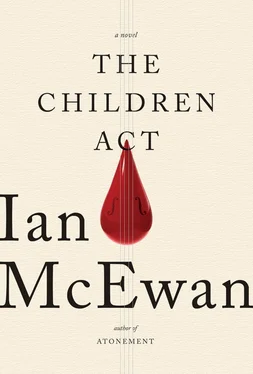She crossed New Square and approached Wildy’s bookshop. The music in her head had faded, but now came another old theme: self-blame. She was selfish, crabbed, drily ambitious. Pursuing her own ends, pretending to herself that her career was not in essence self-gratification, denying an existence to two or three warm and talented individuals. Had her children lived, it would have been shocking to think they might not have. And so here was her punishment, to face this disaster alone, without sensible grown-up children, concerned and phoning, downing tools and rallying round for urgent kitchen-table conferences, talking sense to their stupid father, bringing him back. But would she take him in? They would also need to talk sense to her. The almost-existing children, the husky-voiced daughter, a museum curator perhaps, and the gifted, less settled son, good at too many things, who failed to complete his university course, but a far better pianist than she. Both always affectionate, brilliant at Christmases and summer-holiday castles and entertaining their youngest relations.
She walked along the passage past Wildy’s, untempted by the law books in the window display, crossed Carey Street and went in the rear entrance of the Courts of Justice. Down one vaulted corridor, down another, up a flight of stairs, past some courtrooms, down again, across a courtyard, pausing at the foot of a staircase to shake out her umbrella. The air always reminded her of school, of the smell or feel of cold damp stone and a faint thrill of fear and excitement. She took the stairs rather than the lift, heavy-footed on the red carpet as she turned right toward her broad landing onto which the doors of many High Court judges faced—like an advent calendar, she sometimes thought. In each broad and bookish room, her colleagues would lose themselves daily in their cases, their trials, in a labyrinth of detail and dissent against which only a certain style of banter and irony offered some protection. Most of the judges she knew cultivated an elaborate sense of humor, but this morning there was no one around wanting to amuse her and she was glad. She was probably first in. Nothing like a domestic storm to toss you from your bed.
She paused in her doorway. Nigel Pauling, correct and hesitant, was stooped over her desk, setting out documents. There followed, as always on a Monday, the ritual exchange of inquiries into each other’s weekends. Hers was “quiet,” and saying that word she handed him the corrected draft of the Bernstein judgment.
The day’s business. In the Moroccan case, listed for ten o’clock, it was confirmed that the little girl had been removed from the jurisdiction to Rabat by the father, despite his assurances to the court, and no word of her whereabouts, no word from the father, and his counsel at a loss. The mother was receiving psychiatric help, but would be in court. The intention was to apply through the Hague Convention, Morocco, by good fortune, being the one Islamic state to have signed up. All this was spoken in an apologetic hurry by Pauling, running a nervous hand through his hair, as though he were the abductor’s brother. That poor pale woman, an underweight university don, who trembled while she sat in court, specialist in the sagas of Bhutan, devoted to her only child. And the father devoted too in his devious fashion, delivering his daughter from the evils of the unfaithful West. The papers were waiting on her desk.
The rest of the day’s business was already clear in her mind. As she went to her desk she asked after the Jehovah’s Witness case. The parents would be making an emergency application for legal aid and a certificate would be issued in the afternoon. The boy, the clerk told her, was suffering from a rare form of leukemia.
“Let’s give him a name.” She said it crisply and her tone surprised her.
When under pressure from her Pauling was always smoother, even a touch satirical. Now he gave her more information than she needed.
“Of course, My Lady. Adam. Adam Henry, an only child. The parents are Kevin and Naomi. Mr. Henry runs a small company. Groundwork, land drainage, that sort of thing. Apparently a virtuoso with the mechanical digger.”
After twenty minutes at her desk she went back across the landing, along a corridor to an alcove housing the coffee machine, with a glass image of hyper-real roasted beans spilling from a beaker, lit from the inside, brown and cream, as vivid in the gloom of the recess as an illuminated manuscript. A cappuccino with an extra shot, perhaps two. Better to start drinking it right here, where, undisturbed, she could nauseously picture Jack rising about now from an unfamiliar bed to prepare for work, the form beside him half asleep, well served in the small hours, stirring between sticky sheets, murmuring his name, calling him back. On a furious impulse, she pulled out her phone, scrolled through the numbers to their locksmith on the Gray’s Inn Road, gave her four-digit PIN, then instructions for a change of lock. Of course, madam, right away. They held details of the existing lock. New keys to be delivered to the Strand today and nowhere else. Then, proceeding rapidly, hot plastic cup in her free hand, fearful of changing her mind, she called the deputy director of estates, a gruff good-natured fellow, to let him know to expect a locksmith. So, she was bad, and feeling good about being bad. There must be a price for leaving her and here it was, to be in exile, a supplicant to his previous life. She would not permit him the luxury of two addresses.
Coming back along the corridor with her cup, she was already wondering at her ridiculous transgression, obstructing her husband from rightful access, one of the clichés of marital breakdown, one that an instructing solicitor would advise a client—generally the wife—against in the absence of a court order. A professional life spent above the affray, advising, then judging, loftily commenting in private on the viciousness and absurdity of divorcing couples, and now she was down there with the rest, swimming with the desolate tide.
These thoughts were suddenly interrupted. As she turned onto the wide landing she saw Mr. Justice Sherwood Runcie framed in his doorway, waiting for her, grinning, rubbing his hands in parody of a stage villain to indicate he had something for her. He was a connoisseur of the latest word around the courts, which was usually accurate, and he took pleasure in passing it on. He was one of the few, perhaps the only colleague, she preferred to avoid, and not because he was unlikeable. He was, in fact, a charming man, who gave all his spare hours to a charity he had founded long ago in Ethiopia. But for Fiona he was an embarrassment by association. He had tried a murder case four years back, still awful to contemplate, and painful to remain silent about, as she must. And this in a brave little world, a village, where they routinely forgave each other their mistakes, where all suffered from time to time a judgment rudely overturned in the Court of Appeal, wrists slapped on points of law. But here was one of the greatest miscarriages of justice in modern times. And Sherwood! So untypically gullible in the presence of a mathematically ignorant expert witness, then, to widespread disbelief and horror, sending down an innocent bereaved mother for the killing of her children, to be bullied and assaulted by fellow inmates, demonized by the tabloids and have her first appeal rejected. And when at last released, as she surely had to be, to fall victim to drink, of which she died.
The strange logic that drove this tragedy could still keep Fiona awake at night. The chances of a child dying from sudden infant death syndrome were said in court to be nine thousand to one. Therefore, the prosecution’s expert pronounced, the chances of two siblings dying was this figure multiplied by itself. One in eighty-one million. Almost impossible, and so the mother must have had a hand in the deaths. The world beyond the court was astonished. If the cause of the syndrome was genetic, the children shared a cause. If it was environmental, they shared that too. If it was both, they shared both. And what, by comparison, were the chances of two babies from a stable middle-class family being murdered by their mother? But outraged probability theorists, statisticians and epidemiologists were powerless to intervene.
Читать дальше












